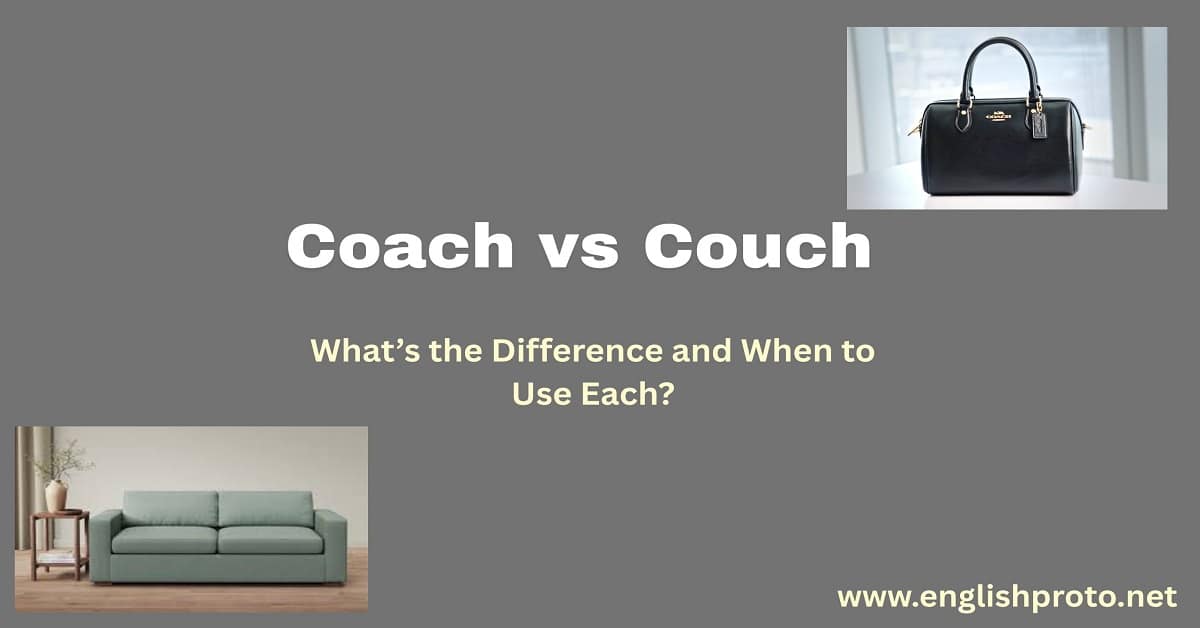Coach vs Couch might look like a tiny spelling difference, but if you’ve ever mixed them up, you know how awkward it can get. One wrong letter can turn your football mentor into living room furniture and that’s not a mistake you want in professional or casual writing.
In this article, you’ll discover the clear differences between these two words, why people often confuse them, and how you can always choose the right one. Stick around you’ll never second-guess “coach” or “couch” again.
Quick Summary: Coach vs Couch
The word coach usually refers to a person who trains or instructs others, or sometimes to a type of vehicle. The word couch, on the other hand, refers to a piece of furniture used for sitting or lying down.
⚡ Quick Tip:
If you’re talking about teaching or training, use coach. If you’re talking about furniture, use couch.
Key Takeaways
- Coach = instructor, trainer, or a bus.
- Couch = sofa, piece of furniture for sitting or lying down.
- These words are not interchangeable and have entirely different contexts.
- Confusion arises because they look and sound similar.
Reasons for Confusion
Why do people often confuse coach and couch? Here are the main reasons:
- Spelling similarity
Both words are just one letter apart, which makes typos common. - Pronunciation overlaps
In some accents, especially in casual speech, coach and couch can sound closer than they actually are. - Typing errors
The letters “a” and “o” are right next to each other on the keyboard. Accidentally writing couch instead of coach (or vice versa) happens frequently. - Context misinterpretation
For non-native speakers, the distinction may not be clear because both words are nouns, and each can appear in everyday conversation.
Detailed Explanation: Coach vs Couch
What Does Coach Mean?
The word coach has multiple meanings, but all are different from couch.
- Trainer or instructor
A coach is someone who teaches or trains, especially in sports, education, or personal development.- Example: The football coach inspired the team to victory.
- Bus or carriage
In British English, a coach also refers to a long-distance bus. Historically, it referred to a horse-drawn carriage.- Example: We took a coach from London to Oxford.
- Private tutor
In some contexts, a coach can mean a private tutor helping with studies.- Example: She hired a math coach to prepare for exams.
What Does Couch Mean?
The word couch almost always refers to furniture.
- Sofa or settee
A couch is a piece of furniture where people sit, recline, or lounge.- Example: He fell asleep on the couch while watching TV.
- Therapy sessions
The word also carries cultural connotations in psychology, since patients are often imagined lying on a therapist’s couch.- Example: She described her feelings while lying on the therapist’s couch.
Usage Comparison in a Table
| Word | Meaning | Example Sentence |
|---|---|---|
| Coach | Trainer or instructor | The tennis coach helped her improve her serve. |
| Coach | Bus or carriage | We traveled by coach to the countryside. |
| Couch | Furniture for sitting or reclining | They bought a new couch for the living room. |
⚡ Quick Tip: If someone is helping you learn, they’re a coach. If you’re lying down, it’s a couch.
Common Errors
Even native speakers make mistakes with these words. Here are some common mix-ups:
- Writing “couch” instead of “coach”
Example: She is a football couch. (Incorrect)
Correct: She is a football coach. - Using “coach” instead of “couch”
Example: He bought a leather coach for the living room. (Incorrect)
Correct: He bought a leather couch for the living room. - Mixing meanings in speech
Because both are nouns, listeners may understand the wrong meaning if the context isn’t clear.
Synonyms or Alternatives
Sometimes, repeating the same word can feel dull. Here are synonyms you can use depending on the situation:
For Coach
- Trainer
- Instructor
- Mentor
- Tutor
- Guide
For Couch
- Sofa
- Settee
- Loveseat
- Divan
- Recliner (depending on style)
Using synonyms not only enriches your writing but also makes your meaning more precise.
Examples in Sentences
To reinforce the distinction, here are clear examples for both words:
Coach
- The basketball coach designed a new training plan.
- We traveled overnight by coach to Paris.
- As a life coach, she helps people achieve their goals.
Couch
- He spilled coffee on the couch and had to clean it immediately.
- They sat together on the couch watching movies.
- The therapist invited him to relax on the couch during the session.
Origins and History
Origin of Coach
The word coach comes from the Hungarian town Kocs, where carriages were made in the 15th century. The term spread through Europe to mean “carriage.” Later, it evolved metaphorically to mean a tutor (someone who “carries” a student through learning), and eventually, a sports trainer.
Origin of Couch
The word couch comes from the Old French coucher, meaning “to lie down” or “to put to bed.” This makes sense since a couch is a piece of furniture designed for reclining or lying.
So while the words look similar today, their histories are quite distinct.
Conclusion: Coach vs Couch
Although coach and couch differ by only one letter, their meanings are worlds apart. Coach refers to a trainer, instructor, or a type of vehicle, while couch refers to furniture for sitting or reclining. The confusion arises from spelling similarity, pronunciation, and typing errors, but once you understand the distinction, it becomes easy to remember.
- If you’re talking about learning, travel, or sports → it’s coach.
- If you’re talking about furniture → it’s couch.
By using these words correctly, you’ll avoid misunderstandings and write with clarity, whether you’re drafting professional content or casual notes. The next time you’re tempted to type one, pause and think: Am I sitting on it or learning from it? That simple question will always guide you to the right choice.



